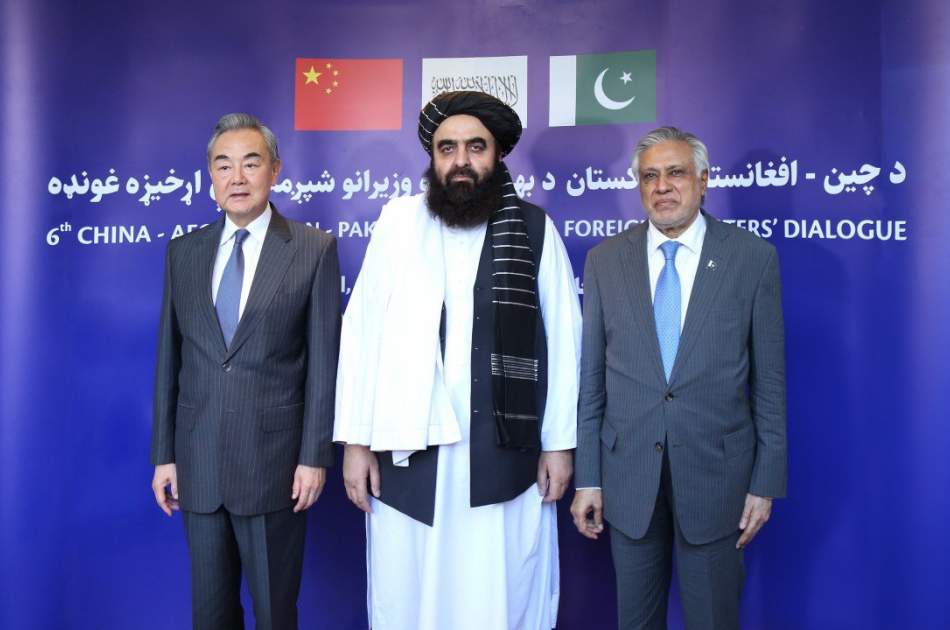Alwaght- Four years into Taliban rule, security concerns remain the biggest roadblock to regional cooperation. While neighbors are eager to develop economic and trade ties with Kabul, their efforts are impacted by reservations and the Taliban's need to provide security guarantees.
In this regard, the third tripartite meeting of foreign ministers of China, Pakistan, and Afghanistan was held in Kabul, with the top diplomats focusing on political, economic, and security cooperation.
According to the Pakistani Foreign Ministry, in this meeting, the three sides committed to strengthening joint efforts against terrorism.
They also announced their commitment to deepen cooperation in the areas of trade, transit, regional development, health, education, culture and combating drug trafficking, as well as expanding the China-Pakistan Economic Corridor (CPEC) to Afghanistan.
Also on the sidelines of this event, Pakistani Foreign Minister Ishaq Dar met with Afghan counterpart Amir Khan Muttaqi to break the ice of the relations between Kabul and Islamabad and the two sides announced their readiness to accelerate the process of upgrading diplomatic relations from chargé d'affaires to ambassadorial level.
However, despite these diplomatic compliments, one issue that cannot be hidden is the security concerns of Pakistan and China overshadowing the tripartite meeting in Kabul, whose political will and the ability of the Taliban to implement their promises have a direct effect on advancing its declared goals.
China and Pakistan security concerns
The most important aspect of China and Pakistan relations with the Talaban is the security concerns. For China, the most worrisome issue is the movement and activities of the East Turkistan Islamic Movement (ETIM) which, in the eyes of Beijing, poses a direct threat to the home security especially in the Muslim-majority province of Xingiang. China is worried that the Taliban would not be able or would not want to fully contain the group and Afghanistan would be a safe haven for the Uyghors of Xingiang.
This security concern is so serious that Beijing has made any extensive economic cooperation with the Taliban conditional on security guarantees in this regard. To this end, the Chinese FM, in a meeting with Taliban Prime Minister Mullah Mohammad Hassan Akhund, called on the group to understand China’s security concerns and attach special importance to addressing them. FM Wang Yi said that effective bilateral security cooperation would facilitate Afghanistan’s progress.
Some sources cited by an Afghan news website said that a total of 15,000 to 35,000 Uyghur fighters and their families are present in Afghanistan, mainly living in the northern provinces, including Takhar, Kunduz, Badakhshan and Nuristan. The presence of such a large number of Islamist fighters could be troublesome for Beijing. However, Mullah Hassan Akhund told the top Chinese diplomat: “Assure the Chinese president that there is no security threat from Afghan soil to China or other countries.”
Pakistan is also facing a similar challenge. Islamabad accuses the Taliban of harboring the Tehreek-e-Taliban Pakistan (TTP), a group that carries out deadly attacks on security forces and civilians on Pakistani soil. Despite promises by the Taliban to prevent Afghan soil from being used against neighboring countries, evidence suggests that serious action has not been taken in this regard, and Islamabad’s distrust of Kabul has increased. Therefore, the Pakistani FM has urged the Kabul authorities to take concrete and verifiable steps against the TTP and the Balochistan Liberation Army-Majeed Brigade (BLA-MB).
Economic priority for the Taliban
Though for China and Pakistan security is the top issue, for the Taliban government the top priority is economy and business in relationship with Beijing and Islamabad. Its foreign ministry announced that the FM Mutaqi has invited the two countries to engage in economic projects in Afghanistan and asked them not to tie this cooperation to other matters.
The Taliban is in dire straits economically and its budget is suffering from major deficit amid international sanctions, the freezing of $7 billion in foreign reserves in Western banks, and the cut of foreign aid. So far this year, the group has eliminated tens of thousands of jobs from its administrative and government structures and cut employee salaries by 20 percent.
To ease pressure on society and boost domestic legitimacy, the Taliban need to open new avenues for trade and investment. Cooperation with Beijing can create economic capacities and ultimately lead to job creation, increased production, and growth in national income for Afghanistan.
As one of the world’s economic powers and a potential investor in Afghanistan’s mines, China is a vital partner for the Taliban. Therefore, the economic cooperation plan can be a way to attract investment and demonstrate Afghanistan’s potential as a regional bridge.
The Taliban is trying to portray itself not simply as a security actor, but as a government in the making with economic plans to gain a more legitimate position on the international stage.
China role in Taliban-ruled Afghanistan
As one of the world's economic powers, China plays a multi-layer and conservative role in Taliban-ruled Afghanistan. Economically, Afghanistan a rich reserve of precious minerals, especially copper, lithium, and trace elements. These resources could play a key role in meeting the long-term needs of Chinese industries.
China also sees Afghanistan as a potential link in infrastructure projects and the CPEC and a route to the Central Asian market, a link that, if realized, would connect Afghanistan to the Belt and Road Initiative (RBI) transport and trade network.
Moreover, unlike many Western countries, China has taken a pragmatic approach. Beijing has not yet recognized the Taliban but has expanded its diplomatic and economic relations with them, and this policy of practical acceptance without formal recognition allows China to exert influence in Afghanistan without the burden of political or legal obligations that would come with international recognition of the Taliban.
Pakistan and the dilemma with the Taliban
Pakistan faces a dilemma regarding the Taliban that has complicated its politics. On the one hand, Islamabad needs a close relationship with the Taliban to manage the security of its long and insecure border with Afghanistan and to keep trade and transit routes open for its economy.
On the other hand, it views the leaders in Kabul with distrust because of the Taliban’s support for Pakistani separatist groups. For this reason, Pakistan’s political and military pressure on the Taliban in this regard has increased, even leading to the closure of border crossings or limited border operations at times. Thus, Pakistan-Taliban relations are in a delicate balance between the need for cooperation and security concerns.
Kabul meeting: Convergence or division?
The Kabul meeting is seen by observers as an effort to create a kind of regional axis consisting Afghanistan, China, and Pakistan. Still, transforming this meeting to a sustainable cooperation is not an easy job as the security differences remain the biggest barrier.
Therefore, although the Kabul meeting demonstrates the willingness of the three parties to cooperate and pave the way for economic partnership, until security differences and mutual distrust are resolved, this engagement will remain largely limited to negotiations and promises. As a result, the formation of a real and sustainable regional axis remains elusive, and cooperation is likely to continue at a limited and conditional level.
Afghanistan’s role in regional equations
The Kabul meeting has an important effect on regional equations and directly impacts regional geopolitical competitions as each of the regional powers pursues various interests in Afghanistan.
India is particularly concerned about the Taliban’s proximity to the China-Pakistan camp, as this process limits New Delhi’s presence and influence in Afghanistan and makes it difficult for India to access Central Asia and its transit routes.
Iran, while welcoming Afghanistan’s economic development and increasing stability by resolving economic and security challenges, is also eyeing participation in trade routes such as the Wakhan Corridor, which runs 50 kilometers from Wakhan district to the Chinese border. With the launch of this corridor, the Khaf-Herat railway could be a good stimulus for Iran-China rail connectivity.
Russia is also wary of China’s growing influence in Afghanistan. Although Moscow can maintain its influence through the Shanghai Cooperation Organization and regional security cooperation, a strong Chinese presence will limit Russia’s traditional role in Central Asia.
The US also sees the Kabul meeting as a sign of China’s expanding influence in the heart of Asia, and this could raise concerns in the context of the strategic competition between Washington and Beijing.
From an economic viewpoint, Afghanistan has a potential place in the CPEC and the RBI. Its geographical location could make it a bridge between South, Central, and West Asia, but realizing this position is tied to ensuring security, safeguarding China and Pakistan’s interests, and improving the Taliban’s relations with the international community.
Given internal insecurity, non-recognition of the Taliban government, and geopolitical rivalries, Afghanistan's full integration into major regional projects seems unlikely in the short run. However, if the Taliban can ensure a minimum level of stability domestically, the path to gradual integration into these projects will be open.
The outlook
The future of relations of the Taliban with China and Pakistan to a large extent depends on how this group responds to the security woes of the two countries. If the Taliban decide to seriously crack down on the anti-Chinese and Pakistani radical groups, stronger relations with Beijing and Islamabad would be more likely. In such a case, Beijing could more confidently begin investing in Afghanistan’s mines and infrastructure projects, and even link Afghanistan to part of the RBI.
Islamabad, too, would upgrade its security and economic ties with Kabul to a more stable level if the threat from the Taliban were to diminish. This path could provide the Taliban with a source of legitimacy and international support.
But if the Taliban turn a blind eye to these concerns and allow the separatist groups to run rampant across Afghanistan, political and security pressures will build on them. Pakistan may take stricter border measures or even launch limited military attacks on terrorist positions inside Afghanistan. Also, China may minimize its business ties with Afghanistan and push the Taliban in further isolation.



























